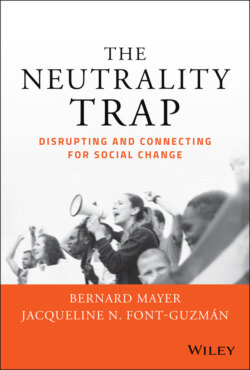Читать книгу The Neutrality Trap - Bernard S. Mayer - Страница 9
chapter one engaging and disrupting for social change
Оглавление“Freedom is not a state; it is an act. It is not some enchanted garden perched high on a distant plateau where we can finally sit down and rest. Freedom is the continuous action we all must take, and each generation must do its part to create an even more fair, more just society.”
—John Lewis, Across That Bridge: A Vision for Change and the Future of America
At a time when our country and our world seem constantly on the precipice of chaos and disaster, we can easily lose faith that the future has anything to offer other than more and worse of the same. Fires rage, hurricanes destroy, pandemics kill, and we seem incapable of doing anything about them. Our political systems seem much better at redistributing wealth upward, maintaining the power of elites, and suppressing dissent than confronting our most serious challenges. Democracy seems in retreat and authoritarianism on the rise across the globe.
But pessimism itself contributes to our political paralysis, and we must never forget that systems do change, people's lives improve, and oppressive governments fall. We are on a long and winding road that takes us to some very surprising, sometimes wonderful, but also frightening places.
Sometimes change is painfully slow, and sometimes advances are undone. Then, suddenly, amazing and important moral progress occurs. What were once unusual and unpopular attitudes about same‐sex marriage, gender fluidity, and sexuality rapidly become far more widely accepted. A totalitarian system that has held millions of people under its thumb suddenly disintegrates. While racism continues to affect every corner of our societies, racist ideology is broadly rejected by growing numbers of people.
But none of these changes occur magically or without significant pain, and all are vulnerable to the immense capacity of systems of power and privilege to defend themselves and claw back progress toward fundamental change. For broadly based and deeply rooted progressive change to occur and for power structures that maintain an oppressive social order to be upended, those systems must be disrupted—something must occur that forces them to change how they operate. The disruption may be unplanned and external (e.g. climate or demographic changes) or intentional and directed (e.g. social movements or political campaigns). The seeds of change are embedded in all organic systems, and that includes oppressive systems that seek to maintain a destructive status quo. How they change, however, is not only not foreordained but largely unpredictable. Yet change will happen, and we will necessarily be part of it.
